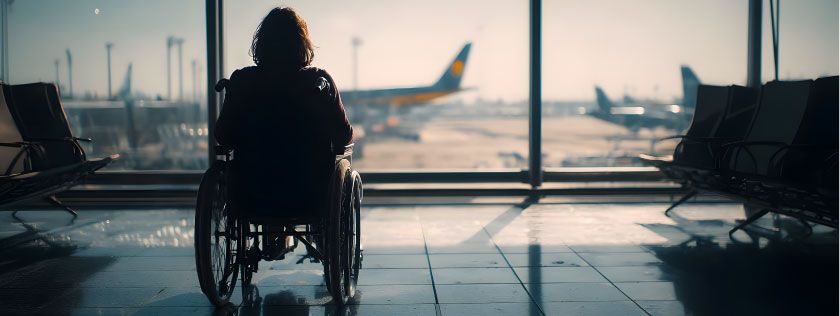Air travel rights for passengers with disabilities or reduced mobility

Travelling by air can be a stressful experience at the best of times. For passengers requiring special assistance due to disabilities or reduced mobility, it can be even more daunting.
With over 650 million people worldwide living with some form of disability, including 50 million in Europe and 13 million in the United Kingdom, they represent the world’s largest minority. And yet too often their needs are overlooked.
So, who is responsible for providing this important assistance?
Responsibility for arranging assistance
Passengers with a disability or reduced mobility are legally entitled to special assistance when they travel. This includes wheelchair users, individuals with physical disabilities, elderly travellers, and those with hidden disabilities such as autism or dementia.
Under regulation (EC) No 1107/2006, it is the airport management companies – not the airlines – who are responsible for providing free assistance to passengers with reduced mobility (PRM).
The regulation requires that:
Passengers have non-discriminatory access to air travel
Free assistance must be provided for boarding, disembarking and transit
Passengers must request assistance at least 48 hours before their flight
Airlines, travel agents and tour operators must offer a free way to request assistance with passengers often advising the airline of their special assistance requirements at the time of booking.
However, across Europe and the UK it is not the airline’s responsibility to arrange the assistance.
This is to be arranged and provided by the Airport Management Company, who may contract a third party for this service. This can lead to inconsistent service standards across different airports.
Common issues and risks
Equality of access to transport and mobility is a fundamental human right, yet time and time again we receive enquiries from disabled passengers who have suffered an injury when travelling by air.
Across the cases in which we have been instructed, we have identified common themes such as:
Staff members failing to identify a hazard when pushing a passenger in a wheelchair
Drivers of buses and other vehicles failing to secure wheelchairs, passengers and other equipment properly
Drivers braking suddenly or colliding with other vehicles on the airport tarmac
Staff members failing to safely operate aisle chairs
Damaged equipment, such as missing, broken or damaged aisle chair straps
More recently, we have seen cases where injuries have occurred due to airline staff failing to give passengers with disabilities the necessary space and time to embark the aircraft and locate their seat safely and without other passengers.
Edinburgh Airport was recently fined £80,000 after a man died following a fall from a lift designed to help passengers with disabilities leave a plane. The Health and Safety Executive (HSE) carried out an investigation and concluded that Edinburgh Airport had failed to maintain the work equipment in an efficient state and in working order.
Many of our clients have expressed their disappointment in the poor service provided, often reporting that they felt humiliated and vulnerable which can lead to a reluctance or fear to travel by air again in the future.
Legal protections for airline passengers
The Montreal Convention 1999 applies to international air travel and governs the airline’s liability for losses occurring onboard and during embarkation and disembarkation. Its purpose is to provide certainty and consistency in the rules that govern international air travel.
Under Article 17 airlines are liable to compensate injured passengers up to a certain amount if a specific criterion is met.
Under Article 21 (2) of the Convention, an airline can limit their liability if it proves either that the damage was not caused by the airline or agent, or that the damage was caused solely by that of a third party. There has been uncertainty as to whether airlines can seek to limit their liability in cases where the airport management company has provided the PRM service provision for passengers requiring special assistance.
In the case of Colin Mather v Easyjet Airline Company Limited and DRK Hamburg Mediservice gGmbh (“DRK”), the Court of Appeal concluded that the test for determining whether a party was the carrier or an agent of the carrier is whether the task was executed in furtherance of the contract of carriage.
In considering what is meant by in furtherance of the contract of carriage, the court stated that the contract of carriage commences when the passenger is checked through the departure gate until they are released into parts of the arrival airport used by other passengers of other airlines. The airline is therefore responsible for the actions of all those assisting passengers along this route, even if the assistance was arranged by the airport management company or a third party.
Disabled passengers have a range of legal protections when travelling by air, but inconsistencies in global regulations can create challenges. By understanding their rights, passengers can better advocate for themselves and seek remedies when necessary.
Airlines and airports must also work to improve service standards and ensure equality of access for all travellers. Given that airlines remain responsible to passengers for injury or death, it is in their interests to do so.
Our Foreign and Travel Department is committed to helping passengers requiring special assistance who have been injured during air travel. Our team has unparalleled expertise in this field and even took steps to clarify the law, providing greater certainty and protection for passengers with a disability or reduced mobility.
If you or a loved one has experienced poor treatment or injury while travelling, we are here to help you navigate your legal rights and secure the support you deserve.

Rona Hayworth, Partner